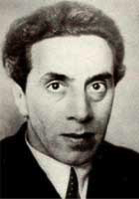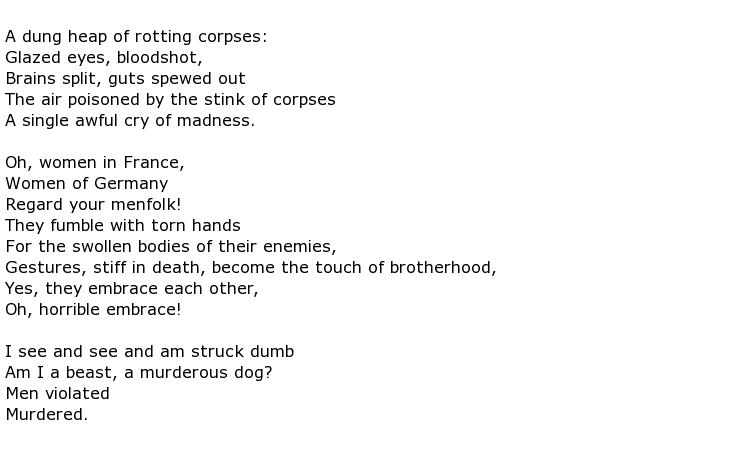 Ernst Toller was a German-Jewish poet and playwright who was well known for his plays written in a style of writing known as Expressionism, a movement popular especially in Germany during the early part of the 20th century. His poetry often portrayed his anger at the senseless slaughter of men during the First World War, with stark titles such as Corpses in the Woods. Left-wing in his political outlook, he served a five year period of imprisonment in 1919 after helping to form the Bavarian Soviet Republic, a splinter group that sought autonomy from the newly-proclaimed Weimar Republic.
Ernst Toller was a German-Jewish poet and playwright who was well known for his plays written in a style of writing known as Expressionism, a movement popular especially in Germany during the early part of the 20th century. His poetry often portrayed his anger at the senseless slaughter of men during the First World War, with stark titles such as Corpses in the Woods. Left-wing in his political outlook, he served a five year period of imprisonment in 1919 after helping to form the Bavarian Soviet Republic, a splinter group that sought autonomy from the newly-proclaimed Weimar Republic.
He was born on the 1st December 1893 in the then Prussian town of Samotschin (Szamocin) which lay in the Province of Posen, now in Poland. His first language was Yiddish but he also spoke German and, later on, he was fluent in English. His father was a successful businessman, dealing in the wholesale grain trade, and Ernst was sent to a boarding school in Bromberg at the age of 12. This was not a happy time for him and he later described it as a “school of miseducation and militarisation”. He was already showing signs of becoming a writer with a number of his articles appearing in a local newspaper called the Ostdeutsche Rundschau.
In order to further his education he studied at the University of Grenoble in 1914 but this was interrupted by the outbreak of war. He was on one of the last trains allowed across the French/Germany border as he found himself on his way back to Bavaria where he enlisted in the army. He felt it was his patriotic duty to defend the Fatherland but soon became disillusioned by the open victimisation of Jews in the ranks. He requested a transfer to the front line trenches to escape this.
Within two years, severely traumatised by the mechanical slaughter that he witnessed daily, he had suffered a mental and physical breakdown and was discharged, unfit for military service. Toller decided to head for Heidelberg to resume his studies at the university. He wrote poetry and was engaged in fierce debates about the ongoing war with, amongst others, the sociologist Max Weber. Toller was very much against the continuation of hostilities. He had witnessed at first hand appalling scenes of death and destruction and his poetry took on a despairing, often angry tone, as evidenced in the following piece called Corpses in the Woods.

His plays were often based on his wartime experiences as well, his first production being Transformation (Die Wandlung, which was written in 1919. Hoping to make a better post-war Germany he teamed up with a number of anarchists and communists to form the Bavarian Soviet Republic and he was President for six days, but it was a short-lived affair. Right wing forces defeated them before the movement had time to get properly established.
The period of imprisonment that followed proved productive from a literary perspective. Toller finished his play Transformation and it was staged in Berlin towards the end of 1919. He penned several more plays and a good number of poems while incarcerated. His reputation as a great Expressionist writer was cemented with this work. As the years went by life became intolerable for a Jew in Germany and he went to the United States in 1933. He spent the rest of his days on lecture tours and on writing projects but he sank into depression when he heard that the Nazis had sent family members to concentration camps. This, and severe financial problems, led to his death by hanging. He was found in a New York hotel room, having apparently committed suicide but others later suggested that he had been murdered.
Ernst Toller died on the 22nd May 1939 at the age of 45.

